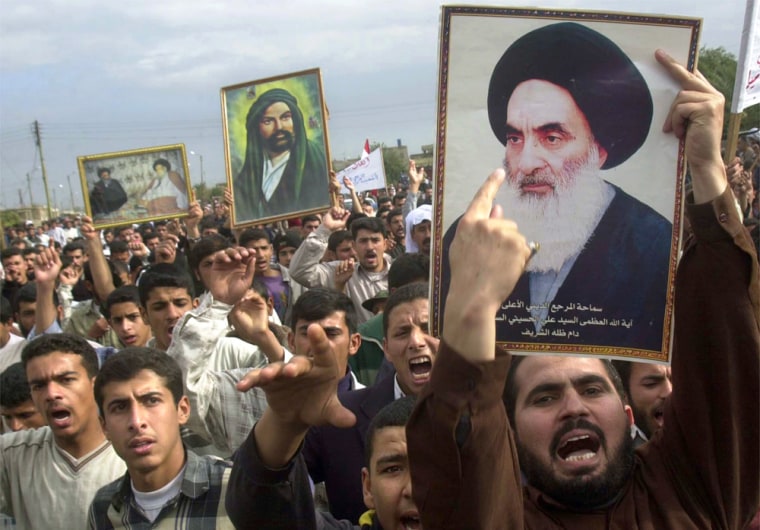Bremer told reporters outside the White House that he would seek the advice of U.N. Secretary-General Kofi Annan on Monday in New York. Bremer said the United Nations had expertise in dealing with elections.
The plan was jeopardized by demands by a senior Shiite cleric that both the transfer of control in Baghdad and the extension of U.S. military peacekeeping operations be submitted to Iraqi voters in a direct election.
Bremer expressed his respect for the cleric, Grand Ayatollah Ali al-Husseini al-Sistani, and said he agreed on a need to adopt democratic institutions. But he said an election could not be scheduled before July 1.
However, he said that there were "all kinds of ways to organize partial elections and caucuses" and that they would be considered.
White House press secretary Scott McClellan had already offered to refine the plan for turning over power to Iraqis, but he also insisted on sticking with the framework of an agreement that calls for an unelected temporary government by July 1.
Busy schedule of meetingsBremer was called home to confer with Bush, national security adviser Condoleezza Rice and Secretary of State Colin Powell.
Monday, Bremer is due to meet with Annan and the U.S.-appointed Iraq governing council on the self-rule plan, which was hammered out Nov. 15.
“Obviously, there are discussions about ways to refine or improve that agreement, but we’re working within the framework of the November 15 agreement,” McClellan said before Bremer spoke. “It spelled out a clear framework for moving forward to transfer sovereignty quickly to the Iraqi people.”
Administration officials insist that they will hold to the July 1 deadline, but they are exploring ways to strike a compromise with al-Sistani and his supporters.
Al-Sistani is pressing for direct, popular elections, rather than the caucuses envisioned in the U.S. plan, as the way to create Iraq's new government. But McClellan said, “here are a lot of things you’d want to have in place for those elections that are not in place at this point.”
Al-Sistani also is insisting that Iraqis should be allowed to vote on whether U.S. peacekeeping troops remained in the country after transition.
Threatening the U.S. blueprint, an aide to the cleric said in Kuwait that if al-Sistani’s advice was rejected, a Muslim edict would be issued to deny legitimacy to any council elected under the U.S. plan. Even some Sunnis respect the Shiite al-Sistani, said the aide, Mohammed Baqir al-Mehri.
Opposition to U.S. planMeanwhile, an associate of al-Sistani’s, Abdel Hakim al-Safi, wrote a letter to Bush and British Prime Minister Tony Blair, accusing the coalition of seeking to deny Iraqis their legitimate aspirations.
“We know that all the excuses you used to hinder the elections are not based on reality,” the letter said.
Adnan Pachachi, the current Iraqi Governing Council president, said Thursday that he believed al-Sistani could be convinced that elections could not be held right away. Still, Pachachi said, "we agreed that there is room for improvement. There are many, many ideas to make it more transparent and inclusive ... whereby the Iraqi people, in a very obvious way, can manifest their desires.”
In light of al-Sistani’s demands, U.S. officials said the Bush administration was reviewing its plan in ways to provide more direct voter participation by Iraqis. Al-Sistani has a reputation for being a moderate, but his stiff stance has cast doubt on whether the administration’s plan can be retained.
“Obviously, we are concerned about working with Iraqis,” State Department spokesman Richard Boucher said. “We are concerned about public opinion. We want to satisfy the needs and demands of the Iraqi people.”
